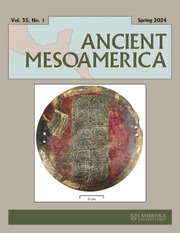No CrossRef data available.
Article contents
THE MIDDLE FORMATIVE OF YUCATAN IN CONTEXT: The view from Yaxuna
Published online by Cambridge University Press: 28 March 2006
Abstract
Assumptions concerning the late dating of Middle Formative ceramics in the northern Maya lowlands and similarities between this region and areas to the south underlie mainstream interpretations that the northern Maya lowlands was slower to develop cultural complexity. This paper is a re-evaluation of these assumptions and their impact on interpretations of Formative interaction. Recent research at Yaxuna, Yucatan, Mexico is discussed in light of alternative approaches to the study of sociopolitical interaction among early complex societies.
- Type
- Research Article
- Information
- Copyright
- © 2005 Cambridge University Press


